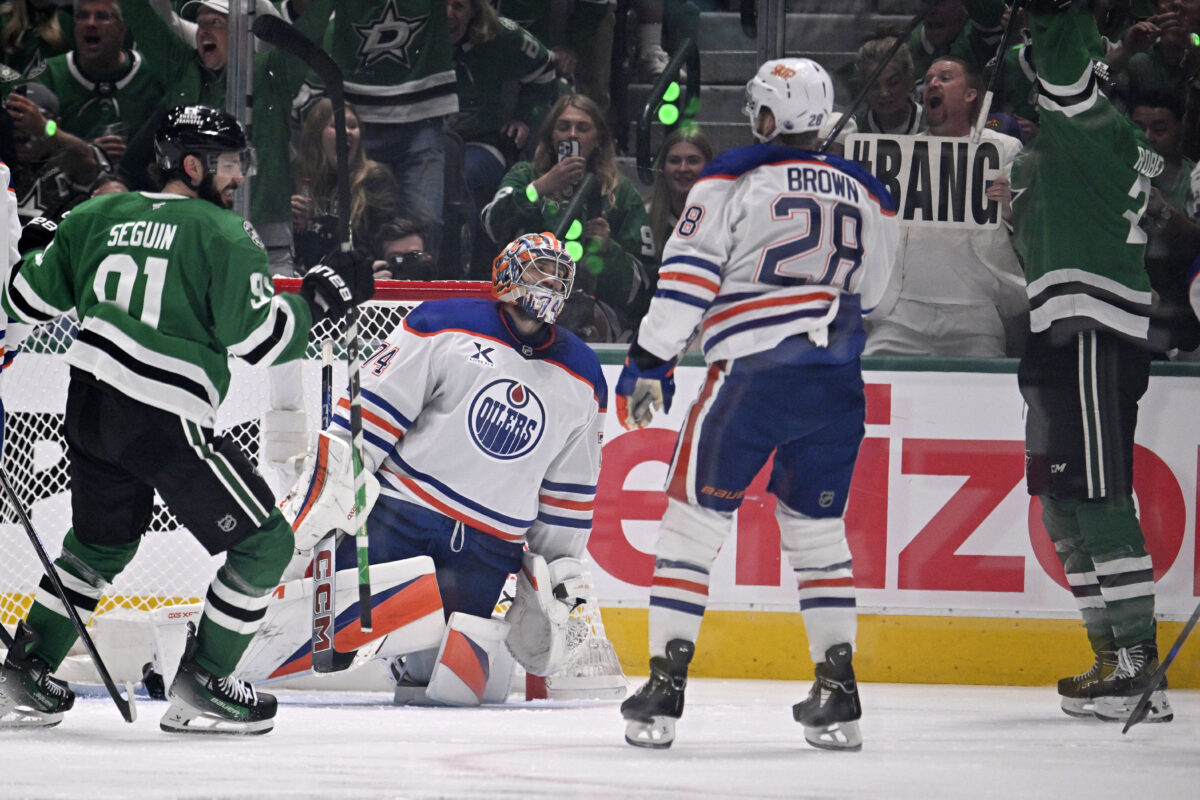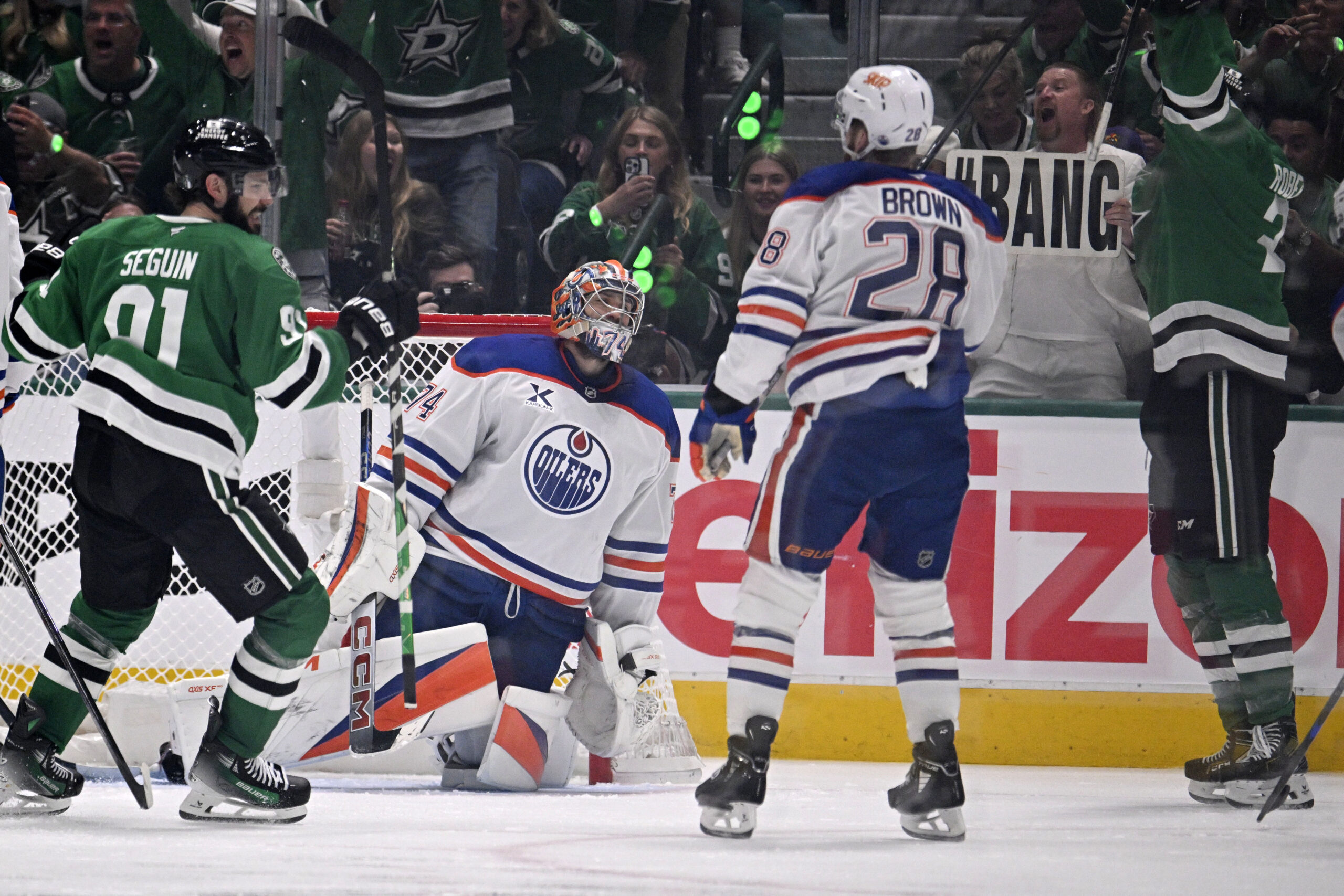The Edmonton Oilers lost Game 1 of the 2025 Western Conference Final to the Dallas Stars by a score of 6-3 at American Airlines Center on Wednesday (May 21).
Evan Bouchard, Leon Draisaitl and Ryan Nugent-Hopkins scored for Edmonton. Tyler Seguin tallied twice for the Stars, who also got goals from Matt Duchene, Mikael Granlund, Miro Heiskanen and Esa Lindell. Oilers netminder Stuart Skinner stopped 22 of the 27 shots he faced, while his Dallas counterpart Jake Oettinger made 24 saves.
Related: 2025 Stanley Cup Playoffs Conference Finals Hub
Edmonton was in front by a score of 3-1 after 40 minutes before the Stars erupted for five unanswered goals in the third period to take a 1-0 lead in the best-of-seven series.
The loss was Edmonton’s first on the road in four weeks. After winning eight of their previous nine games, the Oilers were haunted by old demons in Texas. Here’s a look:
Penalty Kill Disaster
Edmonton watched a 3-1 lead evaporate into a 4-3 deficit before the third period was six minutes old. Heiskanen got Dallas’ comeback started when he rifled the puck past Skinner just 32 seconds into the period. Granlund then tied things up with a goal at 3:49, before Duchene scored on a goalmouth scramble at 5:58 to give the Stars a lead they would not relinquish.
Giving up three goals in a span of 5:26 is bad enough as it is, but here’s the kicker: all three tallies came while Edmonton was shorthanded.

It was a historic meltdown. Only once before in Stanley Cup Playoff history had a team scored three power-play goals in the opening six minutes of a period. But the sight of Edmonton completely going to pieces while trying to kill a penalty is unfortunately a sight all too familiar to Oilers fans this spring.
After going just 1/4 on the penalty kill Wednesday, Edmonton now owns a hideous penalty kill percentage of 62.2% in the 2025 Playoffs. The Oilers have allowed 14 power-play goals, tied for the second most over a team’s first 12 games of a postseason during the salary cap era.
Edmonton appeared to have sorted out its penalty kill woes in Round 2, when the Oilers didn’t allow a single power-play goal over their final three games against the Vegas Golden Knights. But a big factor in the Oilers’ improved penalty kill was discipline: they were only shorthanded a total of six times in those three contests.
On Wednesday, the Oilers took a couple dreadful penalties that proved costly, the most egregious being Corey Perry’s minor for high-sticking Sam Steel at 2:51 that led to Granlund’s tying goal.
If the Oilers can’t shore up their penalty kill, then they’d better stay out of the box. Or if they can’t stay out of the box, then they’d better shore up their penalty kill. Because if they can’t do either, then they’re absolutely cooked, especially against a deadly Stars team that now has 15 power-play goals and is converting at 34.9% with the man advantage in the playoffs.
Curse of the Lead
A remarkable trend has emerged throughout Edmonton’s run thus far in the 2025 Stanley Cup Playoffs, in which neither the Oilers nor their opponent can seem to protect a lead.
Draisaitl opened the scoring on Wednesday with a nifty goal at 10:19 of the first period to put Edmonton in front 1-0, before Seguin answered with a goal of his own at 15:22. Edmonton then played a terrific middle frame, getting goals from Nugent-Hopkins at 6:08 and Bouchard at 7:48, and was full value for its 3-1 lead going into the third period. But as anyone who has watched the Oilers this spring can tell you, a two-goal lead is the most dangerous lead in hockey.
Wednesday was Edmonton’s 12th game this postseason. In seven of them, at least one of the teams has blown a lead of two or more goals, and in four of them, a team has rallied from a multi-goal deficit to win.
In eight of Edmonton’s last 10 games, the winning team trailed at some point during the game. And the team that scores first has gone on to win only three times in the Oilers’ last 10 games.
This has been an absolutely wild postseason, in which Edmonton deserves praise for its ability to rally while being equally deserving of criticism for its inability to protect a lead. Wednesday was none of the former and all of the latter: after they coughed up their 3-1 lead, the Oilers uncharacteristically lost their composure and did little in the way of mounting a comeback attempt.
Skinner’s Struggles
It would not be accurate to pin Edmonton’s Game 1 loss on Skinner, but the Oilers goalie didn’t have his greatest outing on Wednesday and seemed to lose focus as things unraveled in the third period.
The 26-year-old really couldn’t be faulted for any of the Stars’ first three goals, but he lost track of the puck on the go-ahead tally by Duchene, then gestured demonstratively at the official, looking for an interference call even though there was clearly no such infraction by a Stars player.
Seguin would later add an insurance marker at 16:02 of the period, before Lindell put the game on ice by scoring into an empty net with 3:15 remaining. Dallas’ five goals in the final 20 minutes tied the record for the most Edmonton has allowed in a single playoff period.
Thus continues the Jekyll and Hyde experience that is Skinner in the postseason. He started off allowing 11 goals on 47 shots in a pair of losses to open the first round against the Los Angeles Kings. Then, after being benched in favour of Calvin Pickard for six games, Skinner was pressed back into duty when Pickard was sidelined by injury after Game 2 against the Golden Knights.
Skinner gave up four goals in a 4-3 loss in Game 3, before pitching back-to-back shutouts in Games 4 and 5 to backstop Edmonton to a series win. Going into the third period on Wednesday, Skinner had allowed just one goal in the previous 147:05.
Pickard did not travel with the Oilers to Dallas, which would suggest he won’t be ready to return until Game 3 at the earliest. That means it’s up to Skinner to regroup for Game 2 on Friday, when the Oilers will look to even up the series.




